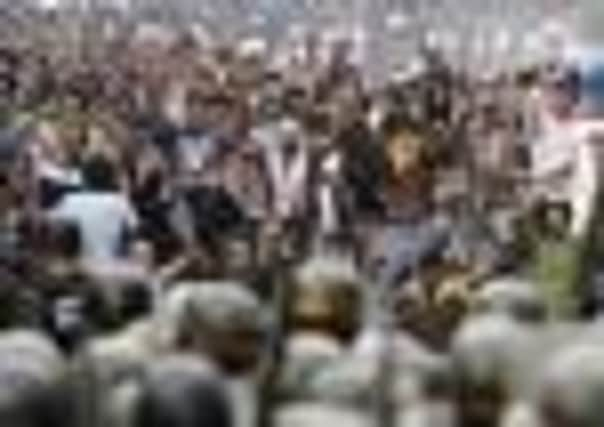Seven dead as protesters back Venezuela recount call


Chief prosecutor Luisa Ortega did not provide any details about the deaths or injuries or how they occurred, but she said 135 people had been detained.
Shortly after she spoke yesterday, however, president-elect Nicolas Maduro said on national television that he knew of five people shot to death in protests on Monday, two of them in the capital and another in the western state of Tachira.
Advertisement
Hide AdAdvertisement
Hide AdMs Ortega said those killed were “humble members of the working class” – language loaded to imply that the opposition might be to blame. And Mr Maduro went further, directly blaming his election opponent, Henrique Capriles.
“You are responsible for the dead that we are mourning today,” Mr Maduro said.
Mr Capriles issued a message on Twitter blaming the government he says stole the election.
“The illegitimate one and his government ordered that there be violence to avoid counting the votes,” he said. “They are responsible!”
Mr Maduro was certified the winner of a presidential election on Monday amid questions about his ability to lead after squandering a double-digit lead in the race despite an outpouring of sympathy for his party following the death of president Hugo Chavez.
The election was triggered by Mr Chavez’s death last month after a two-year battle with cancer. He named Mr Maduro as his successor before he died and his protégé won the election with 50.8 per cent of the vote against Mr Capriles’ 49 per cent.
But protests across the country are posing a challenge even before he deals with oil-rich Venezuela’s mounting economic problems, caused by huge government spending over the past year.
As the National Electoral Council proclaimed Mr Maduro the victor, people stood on their balconies in Caracas apartment buildings banging pots and pans in protest. Across town, thousands of students briefly clashed with National Guard troops who fired tear gas and plastic bullets.
Advertisement
Hide AdAdvertisement
Hide AdProtests continued yesterday. In the city centre, a divided district, government supporters tried to drown out the noise by setting off firecrackers. Some drove lorries with megaphones, shouting pro-Chavista slogans through megaphones. Pedestrians shouted “Chavez lives! Maduro continues!”
Anti-Maduro protests also broke out in other regions, including Mr Chavez’s home state of Barinas.
Mr Maduro announced he had met with a newly created “anti-coup” command at the military museum that holds Mr Chavez’s remains. He accused opposition protesters of attacking government clinics and the house of electoral council president Tibisay Lucena.
Mr Capriles, the governor of Miranda state, hopes to highlight the weakness of Mr Maduro’s mandate and stir up anger over his charge that the electoral council is biased in favour of the ruling Socialist Party.
The strategy could backfire if demonstrations turn into prolonged disturbances, such as those the opposition led between 2002 and 2004, which sometimes blocked roads for days with rubbish and burning tires and annoyed many Venezuelans.
Mr Maduro is not without advantages. The presidency was made immensely stronger by the charismatic Mr Chavez during his 14 years in power, and the ruling socialists will dominate the National Assembly for at least two more years before new elections are held.
Government leaders and military leaders have closed ranks around Mr Maduro in a series of television appearances to defend the official vote count and accuse Mr Capriles of trying to foment violence.